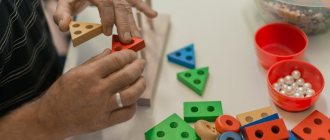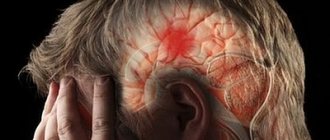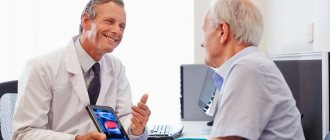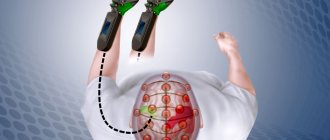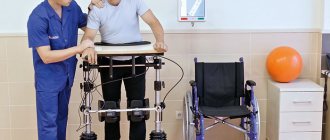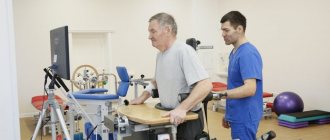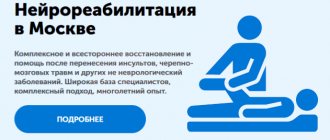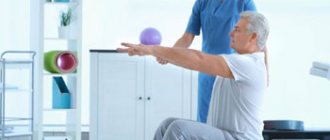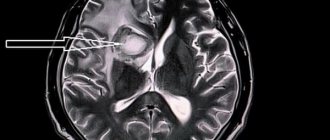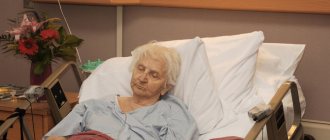Rehabilitation after a stroke at home in Krasnodar and the Krasnodar region will help a person restore all lost skills. But it is necessary that the entire process be carried out under the supervision of qualified specialists using a personal approach. The brain is an extremely important human organ, so in case of any disease it is necessary to take timely measures. Otherwise, this will lead to risks of deterioration in the performance of the entire body.
During the development of the disease, any part of the brain or several at once is affected. And this leads to loss of speech, cognitive, motor functions or a number of others.
A well-designed and compiled rehabilitation program at home helps to cope with all the negative consequences and restore lost functions. It is necessary to be in constant contact with specialists, strictly follow their recommendations, take care of the patient, and provide all possible support and assistance.
And also be sure to evaluate all possible risks and understand whether it is possible to opt for rehabilitation in an inpatient boarding house under round-the-clock supervision of doctors. In Krasnodar and the Krasnodar Territory, such a reliable option is the private boarding house for the elderly “Harmony”.
Possible negative consequences of cerebrovascular accident
Apoplexy is one of the most severe and dangerous types of cerebrovascular insufficiency, in which the optimal amount of blood ceases to flow into the human brain.
As a result, oxygen ceases to flow into organs and systems, which leads to oxygen starvation and various neurological disorders. The initial sign of the onset of the disease is thrombosis, rupture of blood vessels due to vascular insufficiency. The most common negative consequences of such an apoplexy are lack of oxygen, death of neuronal brain cells, and internal hemorrhage.
The attack itself lasts a day or more. And during its onset, the patient must be urgently taken to the hospital, where he will be under the supervision of a team of qualified doctors. It is the timely call of an ambulance, the help of doctors and subsequent rehabilitation that is extremely necessary, since the process of death of brain cells is extremely dangerous and continues even after the main symptoms of pain have already passed.
What is the danger of having an attack?
- Partial or complete loss of physical activity, as the command to the limbs is given by the affected brain.
- Mental disorder, loss of speech and cognitive abilities.
- Memory loss, temporary or complete amnesia.
- Impaired coordination of movements and fine motor skills.
- Complete or partial loss of vision.
- decreased immunity, infectious diseases, etc.
In each specific case, such dangerous consequences manifest themselves to a more or less pronounced degree, while some are absent. This depends on focal or complete brain damage, which directly affects the possibility and duration of recovery.
Fatigue
Fatigue is one of the most common symptoms of stroke. This symptom affects most people who have had a stroke, regardless of its severity, and is usually most noticeable when they return home from the hospital.
This type of fatigue is different from the usual and usual fatigue for us, and it does not depend on your activity or activity. Each of us sometimes feels tired, but this feeling often goes away after rest. However, after a stroke, the fatigue you feel may make you feel like you don't have the energy to do anything. Often you may feel that the feeling of fatigue comes completely unexpectedly and at this moment the only thing you can do is rest until this feeling passes.
Sometimes it takes months or even years for this symptom to go away. Many people after a stroke say they have good days and bad days - days when they feel they can do more things and days when they need to rest more because they feel tired. During the recovery process, good days tend to increase and bad days decrease. Often this fatigue is invisible to other people, so it can be difficult for them to understand what you are feeling. Despite this, you can help yourself in various ways. The key to success is to realize that it is not your fault and it is not your fault. You need to accept the fact that it takes a long time to overcome this symptom of fatigue.
How long does rehabilitation after a stroke last at home in Krasnodar?
The exact recovery time varies from person to person and depends on the following factors:
- State of human health, existing diseases, characteristics of the body.
- The patient's age. With the advent of old age, it becomes much more difficult to restore the body.
- The intensity of the symptoms, the affected areas of the brain and what kind of attack the patient had.
On average, according to statistics, recovery from a primary stroke takes from 3 months to six months, depending on the complexity of the situation. In more complex cases, therapy using specialized methods and technologies can last up to 8 months.
After a secondary attack, the patient recovers for a whole year, the likelihood of a full return of all lost functions is reduced, some of them will remain with the patient. And with the third and subsequent strokes, the likelihood of falling into a coma or death increases significantly.
Rules of care for partial paralysis
Care after an ischemic stroke with partial paralysis as a result of impaired blood circulation in the brain requires a more attentive approach and almost constant presence with the patient. This is due to a serious deterioration in health, manifested as follows:
- Partial paralysis of the limbs of the left or right side of the body, in rare cases - both sides;
- Partial loss of speech, difficulties in pronunciation, loss of the ability to reproduce individual sounds;
- Impaired memory and brain activity - the logic of behavior is lost.
In this condition, there is a high risk of a recurrence of the attack, and before rehabilitation it is necessary to undergo comprehensive treatment and diagnostics to identify and eliminate the likelihood of a recurrence of the stroke. You may have to take a course of special medications.
Care includes following a prescribed program of physical therapy and reflexology to restore body mobility. Classes are being conducted with a speech therapist, work is being done to restore a person’s speech. In this condition, the patient is not able to take care of his own needs, therefore, nursing care after a stroke will be required to carry out hygiene procedures, treat the skin for bedsores and perform other medical appointments. It is imperative to follow a diet and eat specific foods according to a strict schedule. Given the complexity of the condition, it is recommended to work with a psychologist.
When to start recovery after ischemic stroke injury
With such an illness, the patient must immediately go to the hospital to receive professional emergency care, followed by reliable treatment and elimination of the root causes of its manifestation.
The average hospital stay is 2-3 weeks if there are no complications. This period is enough to collect all the tests, identify the characteristics of the situation and drug treatment. But it is recommended to start professional rehabilitation from the first day after an apoplexy strike while still in the hospital under the supervision of doctors . This way you will restore lost speech, memory, etc. as reliably as possible.
Remember, the faster you begin to normalize your condition, the higher the likelihood of obtaining the most favorable prognosis for recovery, and the risk of relapse of an attack will also be reduced. It also allows you to more reliably and safely cope with various secondary diseases that appear after an attack.
Relationship
A stroke does not only affect you, but also those around you. Your relationships with others may become difficult and may be affected by how you feel. Your family and friends will try to understand how you feel and you should be honest with them. By telling them about your feelings and trying to understand what they feel, you can help yourself. Adapting to life after a stroke will lead to some changes in your life and in the life of your spouse, and this can then lead to stress in your relationship. Emotional changes, changes in your body and difficulties in relationships can also affect your sex life.
Main types of stroke
First of all, understand what type of apoplexy the patient has and the further process of recovery depends on this. Thus, the ischemic variant has a more superficial nature of vascular damage and the rehabilitation period will be shorter. But with the hemorrhagic type, the rehabilitation period is longer, but the negative consequences are the least pronounced.
To do this, it is important to identify the main stages of a stroke attack:
- The most acute is the beginning of the blow itself with damage to the nerve endings. Lasts from several hours to a day.
- Acute - occurs in the first minutes after a disruption of nerve connections has already occurred with a pronounced manifestation of dangerous symptoms.
- Subacute. At this stage, specialists have already helped to cope with the attack, prevented the development of death, and stabilized the person’s condition. On average, this stage lasts 3 days and requires mandatory round-the-clock supervision by doctors, reliable care, and following all the prescriptions of specialists to prevent the recurrence of the stroke.
Then a rehabilitation program is carried out, which is divided into early and late . Early occurs within the first few weeks of the client's hospital stay. And late rehabilitation after a stroke at home in Krasnodar is carried out after discharge .
It is important to analyze in more detail the features of rehabilitation in specific areas and identify their features.
Speech rehabilitation
To restore speech skills, the patient will need to consult a speech therapist, who will prescribe exercises for training facial muscles, language, as well as help and certain behavior from loved ones.
The patient's relatives should constantly communicate with him, while pronouncing words slowly and clearly, avoiding complex long sentences. The patient must first train the pronunciation of individual sounds, gradually moving on to syllables and words. Sometimes it is easier for a person to pronounce words in a sing-song manner than in the usual way.
Recommended exercises:
- stretch out your lips like a tube and “bar your teeth”;
- lick and lightly bite lips;
- stick your tongue out of your mouth, stroke your cheeks with your tongue, “click” your tongue;
- puff out one's cheeks;
- smile, trying to use both sides of the mouth symmetrically.
Restoration of motor functions
Often, after suffering an apoplexy, the patient loses his previous motor activity in full or in part. For example, hand motor skills suffer, movement coordination is impaired, and limbs do not move. Doctors also strongly recommend that you strictly adhere to bed rest for the first time and not get up, even if you have the strength to do so. The best option would be to sit on a special bed or use pillows to warm up your arms and legs.
It is useful to use therapeutic massage , which can only be performed by a qualified master. It can be general and complex in nature or affect a specific muscle group. It is also important to develop muscles, which will be an excellent barrier to the appearance of spasms and pain. If the client is unable to move parts of the body, then a passive version of gymnastics is used.
It is important to understand that physical therapy, massage sessions and feasible physical activity alone will not be enough to restore lost motor activity. It is important, along with them, to use professional equipment. For example, by applying current pulses, it is possible to stimulate the affected areas and bring them back into active tone.
Baths and applications are also used as additional measures to improve blood circulation. The doctor may prescribe medications to relax muscles, eliminate pain and spasms. Pay special attention to the person’s face and facial expressions. In case of pinched nerves or paralysis, facial expressions change noticeably. You can cope with its restoration with the help of simple exercises. You should do gymnastics for your eyes and mouth, make a wide smile, pronounce various sounds, squint your eyes tightly and relax your eyelids.
Memory training
Memory and intellectual function training occurs simultaneously with speech restoration. The patient should try to repeat the syllables, words, phrases spoken by the assistant, gradually increasing the interval between pronouncing the word and repetition.
Board games, composing stories based on pictures, solving crossword puzzles, and even simple conversations help restore thinking abilities. Near each item in the room you can put a card with its name. As cognitive functions are restored, the patient can read, watch films, and discuss their content.
Restoring vision, eyes after stroke
Often, apoplexy affects individual vessels that supply the eyeball with everything necessary. This may lead to the following:
- Complete or partial loss of vision.
- Inability to open and close the eyelid.
- Problems moving the eyes up and down and to the sides.
- The appearance of presbyopia is a change in focus and the pensioner cannot distinguish small objects at a short distance.
A professional and experienced ophthalmologist will help you cope with such deviations. It is important to start treatment at the initial stages, carry out complex therapeutic exercises for the eyes, and take medications to relax muscles . In some cases, surgical intervention is necessary to fully or partially restore visual acuity.
Daily routine
A daily home routine can be helpful. Your day will be less monotonous and this will allow you to learn to listen to yourself and determine when you feel active and do some housework accordingly. The daily routine is based on your needs and the needs of your loved ones. Think about what chores you need to do every day, what you can do on your own, what you need help with, and what you will need to learn to do again. Think about how much time you will need to complete all this work. If you feel yourself getting tired, try to perform the most difficult and tiring tasks that require more energy during the day or week when you feel more energized, making sure to take time to rest. It is very important to be as active as possible. Try to continue your hobbies, social activities and other activities as much as possible. And if you can, try to breathe fresh air every day!
Return of lost speech skills
Initially, when a client loses speech, it is important to speak in principle. And after that, specialists will help you work on your diction. First of all, a neuropsychologist works with the patient, helps to identify the problem and finds ways to resolve it. But you should be prepared for the fact that complete recovery may take several years. And all this time, the patient should be observed by a specialist and perform all the necessary exercises at home. It is extremely important to stimulate the speech apparatus with various exercises, both externally and internally.
You need to start the learning process again from simple to complex. If you are unable to restore the muscles of the pharynx and larynx with the help of specialized exercises and massage, then you can use electrical stimulation using professional equipment.
Restoring everyday skills
All everyday skills should be developed under the supervision of a loved one, an assistant who will control the patient’s movements and, if necessary, support and guide his hand.
Nutrition
To prevent spoons and forks from slipping out of the patient’s hand, you can wrap their handles with thin foam rubber. If paralysis/paresis affects the leading hand, then when eating, you should help the patient - support and guide his hand towards the mouth.
Using the tap and washing your face
A chair should be placed in front of the sink so that the patient can wash while sitting. He should open the tap with the affected hand and, if necessary, should be assisted by guiding his hand towards the tap. In this case, the patient should check the temperature of the water with a healthy hand with preserved sensitivity. Once a comfortable temperature has been established, the patient should attempt to wash the affected hand.
Combing
You should choose combs made from non-slip materials, or wrap the comb handle with thin foam rubber. If possible, you should try to comb your hair with the hand with impaired function.
Dressing
Clothes (jacket, shirt) should be loose, fastened with buttons. It is placed on the knees, between which the sleeve for the affected arm is lightly fixed. With the help of the healthy one, she gradually moves into the sleeve.
Restoring cognitive functions after stroke
Such important functions include speech recognition, memorizing information, logical thinking, concentration on something and, in general, human intellectual abilities. The less these important abilities are developed, the worse the general condition and well-being, the quality of a person’s life deteriorates and his life expectancy is reduced.
In older people, this can manifest itself as dementia, the causes of which are as follows:
- Severe bleeding in the brain.
- Affects a large volume on two hemispheres at once.
- 2 or more attacks occur immediately in succession.
- Impairments in those areas where cognitive skills are important for performance.
Characteristic symptoms do not always appear immediately and equally. Memory can deteriorate gradually, a person becomes inattentive, absent-minded, and soon memory lapses appear. This happens because there is a protracted process of degeneration and neural connections are gradually destroyed. The process is also intensified due to tissue ischemia and hypertension.
Patients are treated by a qualified neuropsychologist and occupational therapist, and it is also extremely important to work independently and perform exercises to remember information. Sometimes play therapy is used in the form of board games, crosswords and other things. Additionally, a course of medications can be used to stimulate brain activity.
Prevention of recurrent stroke
To prevent stroke and re-stroke, the following prevention recommendations should be followed:
- Pay attention to blood pressure; high levels often cause cerebral hemorrhage.
- If you suffer from hypertension, consult your doctor and choose the appropriate medication. For a better effect of normalizing blood pressure, you can combine taking pills with moderate exercise.
- Spend more time outdoors, walk more often slowly.
- Give up bad habits, they are the main cause of an attack.
- Watch your weight. Excess weight increases the risk of stroke.
- Try to find positive moments, reasons to laugh, be happy, and do what you love.
How can you speed up rehabilitation after a stroke?
First of all, you should understand that rehabilitation after a stroke at home is carried out in Krasnodar and the Krasnodar region. But a much more effective and efficient option would be to place a person in the sanatorium conditions of a specialized boarding house. A worthy option in Krasnodar for accommodating an elderly person after an apoplexy with the provision of reliable care is the private boarding house for the elderly “Harmony”.
Qualified staff of a private boarding house have the appropriate education and are ready to provide reliable and safe care for an elderly person, which has a positive effect on the pensioner’s well-being and contributes to his recovery. And also an important element of staying in a hospital for recovery is healthy and dietary nutrition, prepared by qualified specialists to get rid of the negative consequences of apoplexy.
Rehabilitation after a stroke in Krasnodar at home can be carried out in mandatory contact with qualified specialists. But in this case it will take longer. If you need to get rid of negative consequences, recover in the shortest possible time, efficiently and effectively, then the best solution would be to choose our private boarding house “Harmony”.
What should you expect when you return home?
When you are discharged from the rehabilitation center, you will be given a discharge summary. It will cover all the necessary guidelines for caring for you at home, as well as the necessary equipment and supplies you may need. Returning home can be initially scary. You may not fully recover and will need to continue rehabilitation on an outpatient basis. You may also have many questions about how you can continue living a full life after a stroke.
Driving
A stroke can affect your ability to drive safely in a variety of ways, such as your physical condition, visual impairment, or difficulty concentrating for long periods of time. In the first months, even after a mini-stroke, you are not allowed to drive. After some months, you will need to visit your doctor, who will give you advice and recommendations regarding driving and will tell you whether you can start driving again. They will likely refer you to have your driving abilities reassessed. It is important to tell your insurance company that you have had a stroke.
Consequences of ischemic stroke
The most common problems that remain after hospital treatment and require recovery include:
- paralysis (complete loss of movement and sensation in parts of the body) or paresis (partial loss of sensitivity and/or movement). Inability to move independently;
- mental, emotional and speech limitations;
- visual impairment, hearing impairment;
- problems with chewing and swallowing functions;
- disturbances in urination and defecation;
- sexual disorders;
- convulsive states and seizures;
- painful sensations.
